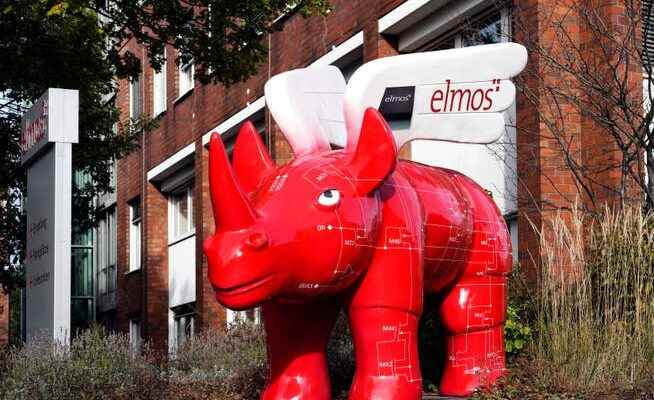The federal government has prohibited the planned sale of a chip factory by the German semiconductor supplier Elmos to the Swedish company Silex. Silex has a Chinese parent company.
Winged Elmos rhino in front of the headquarters of the semiconductor manufacturer Elmos Semiconductor SE in Dortmund.
The German federal cabinet prohibited the planned sale of a chip factory by the German company Elmos Semiconductor SE to the Swedish subsidiary of a Chinese group on Wednesday. In doing so, it followed a suggestion by the Federal Ministry for Economic Affairs and Climate Protection (BMWK), which is in charge of this matter.
Elmos himself already had one on Monday evening Ad Hoc Notice explains that the BMWK has informed the parties involved “that in the upcoming cabinet meeting on November 9, 2022, the sale of Elmos wafer production to Silex Microsystems AB will probably be prohibited”. Silex is based in Sweden but is a subsidiary of the Chinese group Sai Microelectronics.
Habeck on the other hand
In a BMWK press release the ban is justified by the fact that “the acquisition would have endangered public order and security in Germany”. Milder means, such as an approval with conditions, were not suitable for eliminating the dangers identified. The ban is based on foreign trade law.
The Green Economics Minister Robert Habeck put it on record that one must take a close look at company takeovers if important infrastructure is involved or if there is a risk that technology will flow to buyers from non-EU countries. “Especially in the semiconductor sector, it is important to us to protect the technological and economic sovereignty of Germany and Europe,” he explained. Germany is and will remain an open investment location, “but we are not naive either”.
Elmos wants to buy
Elmos develops, produces and sells semiconductors primarily for use in cars. The Dortmund-based company is one of the smaller players in the semiconductor business. In December 2021 had reported itto want to sell its wafer production in Dortmund for 85 million euros to the Swedish Silex.
Wafers are thin slices of silicon. In the factory that was to be sold, chips are made on such wafers. According to the company, it employs 225 of the 1,300 Elmos employees worldwide. Up until now, Elmos has only produced around 40 percent of the chips itself; the company obtains the rest from contract manufacturers or foundries, as they are known in the industry. This is a common business model. In the future, Elmos also wanted to buy from Silex as part of a long-term supply agreement.
A U-turn?
At the end of October, however, the planned transaction provoked political controversy after the “Handelsblatt” had reported, the federal government probably wants to allow the sale. Elmos also stated on Monday evening that the ministry’s notification of the expected ban was “a new development”. Because by Monday, the BMWK had informed the parties involved that the transaction would probably be approved.
According to reports, the Federal Office for the Protection of the Constitution had expressed concerns. On the other hand, some semiconductor experts took the view that the sale would not be a problem, since the specific case involved older technology.
New China strategy
However, in light of geopolitical changes, Chinese investments in German companies are viewed more critically than they were recently. The BMWK and the federal government are currently working on a China strategy. It is not about decoupling, i.e. a complete detachment, according to BMWK circles. Rather, the stated goals are the reduction of one-sided dependencies, the prevention of a technological outflow of key technologies and the protection of infrastructure and the company’s own production capacities from dangers. One of several instruments are the investment review procedures laid down in foreign trade law, which are to be readjusted.
There are currently 41 national investment assessment procedures (including Elmos) in Germany. 17 of these cases concern the planned acquisition of or participation in German companies by Chinese interested parties.
Against this background, the German government decided at the end of October that the Chinese Cosco Group could only take a stake of less than 25 percent instead of the planned 35 percent in one of several terminals in the Port of Hamburg. This case, too, had made waves; he was also controversial within the government. Shortly after the decision, Chancellor Olaf Scholz embarked on a trip to China.
In the ad hoc announcement mentioned, Elmos also stated that in the event of a prohibition, the sale of the wafer production could not be completed. After receipt of the decision, the parties involved would examine it in detail and then decide on further steps.
You can contact the Berlin business correspondent René Höltschi Twitter follow.
